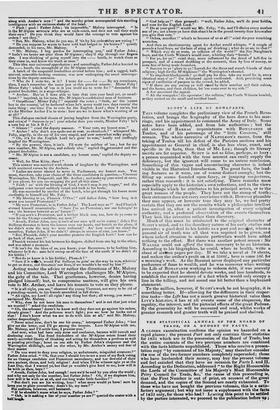SCOTT'S I. I PE OF BONAPARTE.
Tnis volume completes the preliminary view of the French Revo- lution, and brings the biography of the hero down to his mar- riage, and his appointment to command the Army of Italy. Some notes have been added, and from late authorities ; but the old stories of BARRAS' acquaintance with BONAPARTE Dt Toulon, and of his patronage of the " little Corsican," still remain. The whole narrative of NAPOLEON'S career, from the taking of Toulon till his defeat of the Parisian sections and his appointment as General in chief, is also less clear, exact, and specific in its facts, than that of Mr. LEE; though its literary merits are far superior. SCOTT is not so false, perhaps, as hazy a person acquainted with the true account can easily supply the deficiency, but the ignorant will come to an untrue conclusion. Something of this vague and unconvincing character is indeed visible in the historical Introduction. The great facts, the lead- ing features as it were, are of course distinct enough; but the filling up seems founded upon fancy, or jumping conjectures, rather than research : it is not satisfying. These remarks more especially apply to the historian's own reflections, and to the views and feelings which he attributes to his principal actors, or to the great masses of the people. They have not the stamp of truth their statement does not carry conviction with it. however plausible they may appear, or however true they may be, we feel pretty certain that they are not the results which a philosophic intellect has arrived at, after a patient investigation of every uriginal authority, and a profound observation of the events themselves. They look like invention rather than discovery. Much of this must be attributed to the original character of Scurf s mind, and to the desultory nature of his early :.ttelies and pursuits; a good deal to his habits as a poet and noviAist, where a general air of truth was all that was required to be given, and where indeed attention to minute particulars would have added nothing to the effect. But there was another potent reason : Sir WALTER could not afford the time necessary to be an historiaa. According to his biographies, he could, when in health, write a sheet of sixteen pages per day. If we take a novel at 70 sheets, and reckon the author's profit on it at 35001., here is some 50/. for a morning's work. As the Baronet never displayed any particular preference of fame to wealth, and he was moreover when writing the Life of BONAPARTE working to redeem debt, it was scarcely to be expected that he should devote weeks, and lose hundreds, to- establish the exact accuracy of a fact which would only occupy a line in the telling, and not sound one bit better than a haphazard statement.
To the million, however, if Scorr's work be not biography, it is- something better. If—allowing for the difference in their respec- tive tasks—the Life has not a much greater historical value than LBW'S histories, it has at all events some of the eloquence, the rapidity, the interest, and the pictorial effects of the great Paduan. By the generality he will be censured and read, whilst works of greater research and greater truth will be praised and shelved.


























 Previous page
Previous page